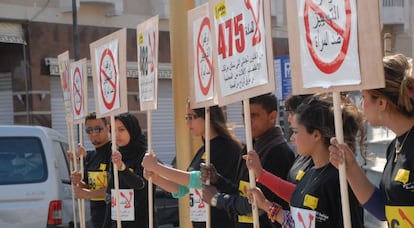My body, not the state’s
NGOs are campaigning to put sexual and reproductive rights on agenda for development goal talks Led by Amnesty International, the groups cite changes to Spain's abortion law as retrograde


The World Health Organization (WHO) says around 22 million unsafe abortions are carried out every year, resulting in the death of some 47,000 women. Most of them occur in countries with highly restrictive abortion laws or where voluntary interruption of a pregnancy is illegal. Contraception can help avoid unwanted pregnancies, but around 215 million women do not use it, either because they have no access to family planning or sex education programs, or because their husbands do not allow them. The magnitude of the problem can be illustrated with one statistic taken from a United Nations survey carried out in 2012: 60 percent of teenagers in sub-Saharan Africa do not know how to prevent a pregnancy, and more than a third do not know where they could acquire contraceptive devices. At the same time, the International Center for Research on Women (ICRW), a Washington-based non-profit organization, estimates that more than 14 million girls who are still going through puberty give birth each year, either because they have been raped or because they have been forced into marriage.
Human rights NGO Amnesty International (AI) says the data reveals the extent to which, in many countries, the state continues to exercise control over people’s bodies, either through laws restricting or criminalizing abortion, permitting child marriage, or by punishing relationships outside marriage; many of these countries do not have sexual education or family planning programs with access to contraception. Furthermore, there are still around 100 countries worldwide where same-sex relationships are punishable by long prison terms, or even death.
“It is incredible that in the 21st century, there are still countries that permit premature marriage, rape within marriage, or that forbid abortion, sex outside marriage, and same-sex relationships, punishing such offenses in some cases with death,” says Salil Shetty, AI’s secretary general.
In response, Amnesty has launched My Body, My Rights!, a campaign to remind world leaders of their obligation to respect and protect their populations’ sexual and reproductive rights during negotiations to set the new global agenda that will replace the Millennium Development Goals (MDG) set for 2015. The organization says international commitment is required to tackle the “restrictive and regressive” policies of many countries in this regard. Within the context of what it is calling a “global offensive against sexual and reproductive rights,” AI highlights the Spanish government’s proposals to change the country’s abortion laws: “If this draft law on abortion rights is passed by parliament, it will severely restrict women and girls’ access to this intervention.”
What are my sexual and reproductive rights?
Amnesty International report: My Body, My Rights! (2014)
Sexual and reproductive rights are human rights that all of us are entitled to enjoy. They give us the following rights:
- To make our own decisions about our health, body, sex life, and identity without fear of pressure or discrimination.
- To ask for and receive information about sexuality, reproduction, and access to health and related services, as well as contraception.
- Decide if we want children, and how many and when.
- To choose our partner, and decide if and when we wish to marry.
- Decide what type of family we wish to have.
- To live free of discrimination, pressure or violence, including rape and other forms of sexual violence, female genital mutilation, pregnancy, abortion, sterilization and forced marriage.
On March 8, International Women’s Day, the ICRW launched its own campaign to push for the inclusion of measures to prevent child marriage and to increase access to information on contraception and family planning for young people in the talks to set the post-2015 MDG agenda. “Without this, progress toward achieving objectives such as reducing maternal mortality and eradicating poverty will slow down,” it says.
In many countries, particularly in Asia and Africa, girls receive no education about their body, sexuality, reproductive system, or contraception. “This is very important, because this kind of education doesn’t just inform them about contraception and safe sex, but also provides tools enabling young people to be able to make their own decisions, giving them the confidence to make their own decisions,” says Priya Nanda, ICRW’s director for economic and social development. “Education about their sexual rights also promotes equality. This is particularly important for girls who are being married off at an early age.”
A recent case from Afghanistan illustrates the terrible situation that many young women in the developing world face. Sahar Gul, now aged 16, was just 11 when her parents sold her to a man almost three times her age. “I was very small, and knew nothing about married life or what happened after the marriage ceremony,” she says. Sahar refused to have sex with her husband, prompting her in-laws to lock her in an unlit cellar for six months. She was beaten and burned with an iron and cigarettes, and had her fingernails pulled out. Eventually, her parents told the police, who found her almost unconscious and unable to stand up. Her husband and several members of his family were convicted, but their sentences were later overturned.
Teenage pregnancy is another problem in many developing countries where contraception is restricted or simply doesn’t exist. “We have to spread awareness, and to make sure that those who are informed about sexual and reproductive rights spread the word to others,” says Kando Seraphine, a young activist in Burkina Faso quoted by ICRW. Contraception is virtually unknown in this landlocked, mainly Islamic West African nation, one of the poorest in the world.
“Cultural and religious norms, gender discrimination, and practices such as child marriage further hinder a difficult situation caused in large part by poverty, reducing women and girls’ ability to make decisions for themselves,” says AI’s report. Speaking openly about sex is taboo in many countries, further reducing the likelihood that women will ask for information from healthcare professionals. And when they do, their husbands often lodge complaints against hospitals and health centers.
ICRW’s Nanda points out that the opposition by many governments (and not just in the developing world) to health education for women is usually a reflection of the dominant views in those countries. But she also points out that in the United States, the “just say no” slogan of the George W. Bush administration was based on the “erroneous idea among a vocal minority that educating young women about sex would lead them to be more promiscuous, while all the research shows the opposite,” says Nanda. “Knowledge and acquisition of the tools associated with sexuality and reproductive rights allow young women to make decisions and to have safe relationships.”
It is incredible that there are still countries that permit rape within marriage”
Ignorance about contraception is also preventing progress in reducing the number of unwanted pregnancies, maternal mortality, and even poverty, says the United Nations Population Fund (UNFPA), whose stated aim is to promote the right of every woman, man and child to enjoy a life of health and equal opportunity. The organization estimates that wider use of contraception would prevent around 187 million unwanted pregnancies each year, along with 105 million induced abortions and 215,000 deaths in childbirth. But in many countries, such as Indonesia, only married couples are given access to family planning clinics.
Furthermore, the legal systems of many countries around the world offer no protection to women who have been raped. In some cases, such as in the Muslim states of northern Nigeria, or in the Gulf, they are invariably seen as the guilty party, on the basis that they have had sexual relations outside marriage. AI says it has evidence of cases in which rape victims cannot report what has happened to them for fear of being accused by the authorities of “immoral acts,” a perception that is backed by the social stigma associated with public recognition that they have had sexual relations outside marriage, even against their will.
When abortion, whether due to rape or simply out of the wish not to have a child, is not an option, then women often have no choice but to terminate a pregnancy by clandestine means. The WHO says around 13 percent of maternal deaths are due to backstreet abortions. Most countries in Africa, Asia and Latin America still ban abortion on any grounds. But there are still several states in Europe where abortion is banned by law, among them Ireland and Poland, and the Spanish government, which has an absolute majority in Congress, is now intending to severely restrict access to abortion.
Spain’s current abortion law, implemented by the previous, Socialist Party administration in 2010, is on a par with legislation in France and the United Kingdom, whereby a woman can terminate a pregnancy up to the 12th week on demand. In cases where the fetus, if carried to term, will suffer from severe physical or mental defects, the limit is 22 weeks. There is no time limit if the abortion is necessary to avert a serious risk to the physical or mental health of the pregnant woman.
The legal systems of many countries offer no protection to women who have been raped
But very few state-run hospitals in Spain will carry out abortions, and less than five percent of terminations take place within the public health system, largely because significant numbers of healthcare professionals have signed clauses freeing them on religious grounds from the obligation to terminate pregnancies.
AI’s campaign not only calls for women to be empowered to make their own healthcare and family planning decisions, but also to get the United Nations to include the decriminalization of homosexuality on the agenda that will replace the MDGs. The organization says that punishing homosexuality is an unacceptable interference by the state in people’s private lives and their control over their bodies and sexuality.
“The My Body, My Rights! campaign aims to make the next generation aware of their sexual and reproductive rights, and to demand them. We want to work on this in a united fashion, and tell governments clearly and unequivocally that these levels of control violate human rights and are unacceptable,” says AI’s secretary general.
In figures
Around 40 percent of women of childbearing age live in countries where abortion is banned, severely restricted, or inaccessible for other reasons.
Some 47,000 pregnant women die each year from complications derived from unsafe abortions, according to the WHO.
An estimated 215 million women do not use contraception, despite not wanting to have children, or to delay doing so, says the International Center for Research on Women (ICRW).
Using contraceptives would save the lives of around 215,000 women who die in childbirth each year.
In Europe, 24 countries required transgender people to submit to sterilization if they wish their new sexual identity to be recognized (Transgender Europe).
Homosexuality is a criminal offense in at least 78 countries around the world, according to the International Lesbian, Gay, Bisexual, Trans and Intersex Association.
More than 14 million teenage girls give birth each year as a result of forced sexual relations or unwanted pregnancies (ICRW).
Around 60 percent of teenagers in four sub-Saharan African countries do not know how to terminate a pregnancy, and more than a third do not know how to access contraception, says a WHO survey from 2012.







































